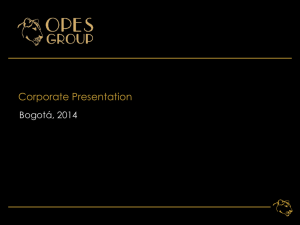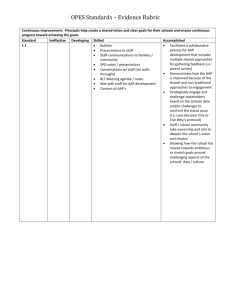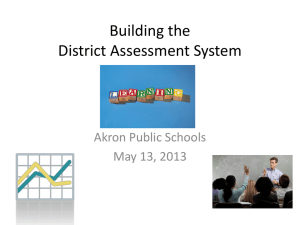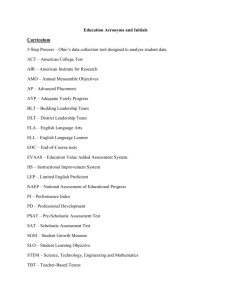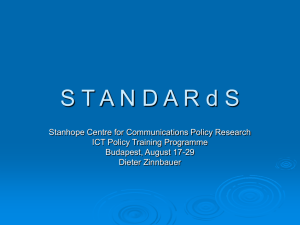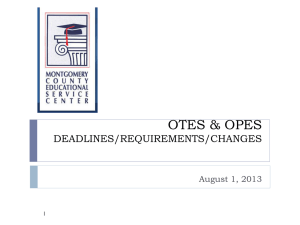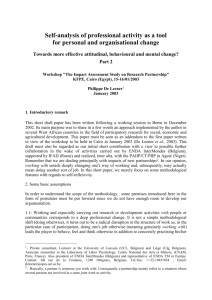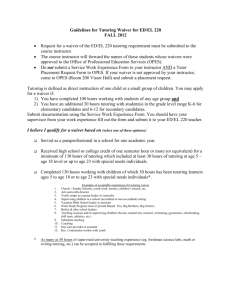ppt
advertisement
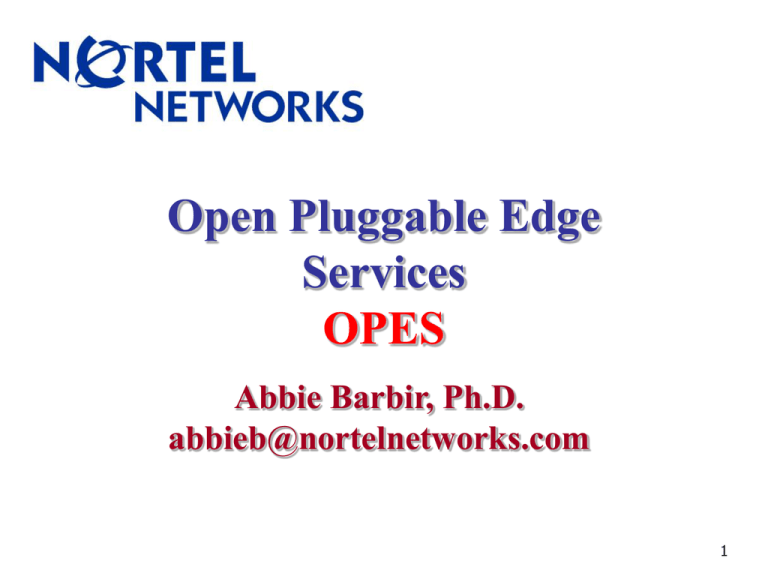
Open Pluggable Edge Services OPES Abbie Barbir, Ph.D. abbieb@nortelnetworks.com 1 Summary Presents an overview of OPES model and architecture Core Model Elements are OPES Intermediary OPES Admin Server Remote Call-out Server Introduce Content Services Overlay Networks Current Issues of OPES in IETF 2 Some Definitions DELEGATE A 'caching proxy' located near or at the network access point of the 'user agent', delegated the authority to operate on behalf of, and typically working in close co-operation with a group of 'user agents‘. SURROGATE A gateway co-located with an origin server, or at a different point in the network, delegated the authority to operate on behalf of, and typically working in close co-operation with, one or more origin servers. Responses are typically delivered from an internal cache. OUT-OF-PATH Out-of-Path Content Services are not natively in the transport path of an application. In other words, they are not necessarily resident (or coresident) on entities that are natively in the path of application flows. In-PATH In-Path Content Services are naturally within the message path of the application they are associated with. This may be an application proxy, gateway, or in the extreme case, one of the end-hosts, that is party to the application 3 Some Definitions POLICY DECISION POINT A logical entity that makes policy decisions for itself or for other network elements that request such decisions. POLICY ENFORCEMENT POINT A logical entity that enforces policy decisions. CONTENT SERVICE NETWORK An overlay network of 'intermediaries' layered onto an underlying network that incorporate 'content services' that operate on messages flowing through the 'content path' CONTENT PATH Describes the path that content requests and responses take through the network. Typically, Requests/Responses flow between a client, an 'OPES intermediary', and a 'content server‘ 4 OPES System Model Remote Call-out Server Local Exec. Env. Client Remote Exec. Env. OPES Engine/PEP OPES Intermediary Provision OPES Content Server Content Services OPES Admin Server Authentication Authorization/PDP Accounting 5 OPES Engine Components Remote Call-out Protocol(s) Proxylet Proxylet Proxylet Library Proxylet Run-time System Local Exec. Env. Clients (4) (1) Remote Remote Call-out Call-out Stub Stub Remote Call-out System Remote Exec. Env. Rule Module Rule Module Rule Processor Message Parser (3) (2) Content Servers OPES Engine 6 Surrogate Authoritative Domain Origin Server Authoritative Domain OPES Admin Server OPES Intermediary Remote Call-out Server Client 7 Delegate Authoritative Domain Origin Server OPES Intermediary Authoritative Domain OPES Admin Server Client Remote Call-out Server 8 Content Service Overlay Networks Remote Call-out Server Client OPES Admin Server OPES Engine Edge Node Content Services Network Overlay Content Network Overlay Client Packet Network Origin Server Client 9 Relation to other Work Content Edge TCN Proxy cache UPIP Origin Server iCAP Client Client iCAP P3P What I will let someone else do with which info iCAP Server P3P Specify what I do with info I collect DIWG Device Capabilities CC/PP Client device capabilities User preferences……… OPES ESI Object Level Cache 10 OPES Complementary efforts IETF Transparent Content Negotiation (TCN) W3C P3P CC/PP DIWG ESI ICAP Org ITU ICAP Content Description (MPEG-21) Others DRM Policy Audit, Log, Performance, Fault mgmt Security 11 OPES Issues in IETF OPES services should be traceable by the application endpoints of an OPES-involved transaction, Both service providers and end-users should detect and respond to inappropriate behavior by OPES components Services provided in the OPES framework should be reversible by mutual agreement of the application endpoints OPES protocol must include authorization as one if its steps, and this must be by at least one of the of the application-layer endpoints (i.e. either the content provider or the content consumer). 12 OPES Status in IETF WG status just approved New Charter Define a framework and protocols to both authorize and invoke distributed application services while maintaining the network's robustness and end-to-end data integrity Server-centric (administrative domain that includes the origin server) client-centric (administrative domain that includes the user agent) Investigate whether the developed architecture must be to be compatible with the use of end-to-end integrity and encryption May need to examine the requirements for both authorization and invocation of application services inside the network Create an architecture for OPES services applied to application messages, and specify the protocol for HTTP and RTP/RTSP Define methods for specification of policies, as well as the rules that enable application endpoints to control execution of such services 13 Q&A 14
